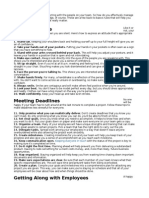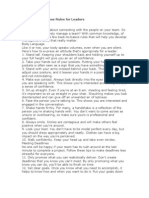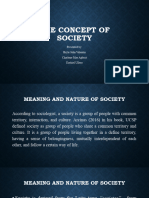0 ratings0% found this document useful (0 votes)
14 viewsCHAPTER3 TheEntrepMind
CHAPTER3 TheEntrepMind
Uploaded by
Jhimar Peredo JuradoThis document contains three sections: 1) A list of 15 major entrepreneurial competencies for successful entrepreneurs such as initiative, persistence, problem solving abilities. 2) Seven guidelines for entrepreneurs to do the right thing such as communicating values before goals and managing long term priorities. 3) A 55 item self-assessment questionnaire for entrepreneurs to rate themselves on personal entrepreneurial competencies.
Copyright:
© All Rights Reserved
Available Formats
Download as PDF, TXT or read online from Scribd
CHAPTER3 TheEntrepMind
CHAPTER3 TheEntrepMind
Uploaded by
Jhimar Peredo Jurado0 ratings0% found this document useful (0 votes)
14 views4 pagesThis document contains three sections: 1) A list of 15 major entrepreneurial competencies for successful entrepreneurs such as initiative, persistence, problem solving abilities. 2) Seven guidelines for entrepreneurs to do the right thing such as communicating values before goals and managing long term priorities. 3) A 55 item self-assessment questionnaire for entrepreneurs to rate themselves on personal entrepreneurial competencies.
Original Title
CHAPTER3.TheEntrepMind
Copyright
© © All Rights Reserved
Available Formats
PDF, TXT or read online from Scribd
Share this document
Did you find this document useful?
Is this content inappropriate?
This document contains three sections: 1) A list of 15 major entrepreneurial competencies for successful entrepreneurs such as initiative, persistence, problem solving abilities. 2) Seven guidelines for entrepreneurs to do the right thing such as communicating values before goals and managing long term priorities. 3) A 55 item self-assessment questionnaire for entrepreneurs to rate themselves on personal entrepreneurial competencies.
Copyright:
© All Rights Reserved
Available Formats
Download as PDF, TXT or read online from Scribd
Download as pdf or txt
0 ratings0% found this document useful (0 votes)
14 views4 pagesCHAPTER3 TheEntrepMind
CHAPTER3 TheEntrepMind
Uploaded by
Jhimar Peredo JuradoThis document contains three sections: 1) A list of 15 major entrepreneurial competencies for successful entrepreneurs such as initiative, persistence, problem solving abilities. 2) Seven guidelines for entrepreneurs to do the right thing such as communicating values before goals and managing long term priorities. 3) A 55 item self-assessment questionnaire for entrepreneurs to rate themselves on personal entrepreneurial competencies.
Copyright:
© All Rights Reserved
Available Formats
Download as PDF, TXT or read online from Scribd
Download as pdf or txt
You are on page 1of 4
CHAPTER III
a. Entrepreneurial Competencies
b. Guidelines in Entrepreneurship
c. PEC’s Self Rating Questionnaire
Major Entrepreneurial Competencies for a successful entrepreneur
A competency is an underlying characteristic of a person which leads to his/her superior
performance in a job. Thus, entrepreneurial competencies are the underlying characteristics of an
entrepreneur which result in superior entrepreneurial performance.
An entrepreneur is a person who creates something new and assumes the risks and rewards
associated with that innovation. There are some major competencies that lead to superior
entrepreneurial performance. These are as follows:
(1) Initiative: It is an entrepreneur who initiates a business activity.
(2) Looking for opportunities: Entrepreneur always looks for an opportunity and takes appropriate
actions accordingly.
(3) Persistence: He follows the Japanese proverb “Fall seven times; stand up eight”. He makes
repeated efforts to overcome harriers.
(4) Information seeker: Entrepreneur always searches for information from various researchers and
consulting experts.
(5) Quality Conscious: An entrepreneur always tries to beat the existing standard of quality.
(6) Committed to working: Entrepreneur does every sacrifice to get the task completed.
(7) Efficiency seeker: Entrepreneur always tries to get the task completed within minimum costs and
time.
(8) Problem Planning: Entrepreneur always tries to develop realistic and proper plans and then
executes carefully to accomplish the task.
(9) Problem solver: Entrepreneur always tries to find out ways and means to tide over the difficult
times.
(10) Self-confidence: Entrepreneur has a strong belief in his strengths and abilities.
(11) Assertive: Entrepreneur is always assertive.
(12) Persuasive: Entrepreneur is able to successfully persuade others to do what he actually wants
from them.
(13) Efficient monitors: Entrepreneur personally supervises the work so that it is done as per the
desired standard.
(14) Employees’ well-wisher: Entrepreneur has great concern and also takes the necessary steps to
improve the welfare of the employees.
(15) Effective strategists: Entrepreneur introduces the most effective strategies to affect employees to
achieve the enterprise goal.
7 Guidelines for Entrepreneurs to Do the Right Thing, Whatever That Means
1. Consistently communicate values before goals.
Make it evident that your values drive your business goals, rather than goals driving values.
Communicate personally and interactively with your constituents, both inside and outside the
organization. Don’t allow anonymous and impersonal messages to go out, and always ask for
feedback.
2. Build an organizational culture based on ethics.
This starts with hiring the right people, and giving them the training and support they need on
a regular basis. It also means rewarding people for making the right decisions on social responsibility,
sustainability and adherence to ethics. You must be the model of the culture you want.
3. Manage your company based on long-term priorities.
By demand, entrepreneurs are crisis managers, and can be busy reacting 24 hours a day to
urgent short-term issues. Entrepreneurs who do the right thing are able to balance their priorities,
including both business and personal, and focus their priorities on long-term goals and values.
4. Set the bar high on standards.
Doing the right thing means never accepting “good enough” or making excuses for lapses.
Apply the same high bar to product quality, employee satisfaction, social responsibilities and
customer service. Don’t let day-to-day demands take the reins and drag you off course.
5. Provide leadership to your team for doing the right thing.
It’s impossible to train the team on every possible contingency, but it is possible to set the
right tone and define ethical guidelines. This is real leadership, and requires constant communication,
motivation, recognition and accountability. Be a coach, rather than a dictator.
6. Personally collect and accept customer and employee feedback.
These interactions cannot be filtered by others, or brushed off as not representative of reality.
Great business leaders always find the time to talk directly to both customers and employees, and
realizes the importance of both to the long-term impact of the business.
7. Continually refine your values and goals based on changes in the world.
Society and every marketplace is changing more rapidly these days, so it’s easy to get
distracted and out of tune with reality. Be especially sensitive to emerging “quality of life” issues for
customers, employees and yourself, and tune your business focus to address these.
Personal Entrepreneurial Competencies (PECs) self-rating
Instructions:
This questionnaire consists of 55 brief statements. Read each statement and decide how
well it describes you. Be honest about yourself. Remember, no one does anything very well, nor
is it even good to do everything very well.
Select one of the numbers below to indicate how well the statement describes you:
5 – always
4- usually
3- sometimes
2- rarely
1- never
Some statements may be similar but no two are exactly alike.
1. I look for things that need to be done.
2. When faced with a difficult problem I spend a lot of time trying to find a solution.
3. I complete my work on time.
4. It bothers me when things are not done very well.
5. I prefer situations in which I can control the outcomes as much as possible.
6. I like to think about the future.
7. When starting a new task or project, I gather a great deal of information before going ahead.
8. I plan a large project by breaking it down into smaller tasks.
9. I get others to support my recommendations.
10. I feel confident that I will succeed at whatever I try to do.
11. No matter whom I’m talking to, I’m a good listener.
12. I do things that need to be done before being asked to do so by others.
13. I try several times to get people to do what I would like them to do.
14. I keep the promise I make.
15. My own work is better than that of other people I work with.
16. I don’t try something new without making sure I will succeed.
17. It’s a waste of time to worry about what to do with your life.
18. I seek the advice of people who know a lot about the tasks I’m working on.
19. I think about the advantages and disadvantages or different ways of accomplishing things.
20. I do not spend much time thinking about how to influence others.
21. I change my mind if others disagree strongly with me.
22. I feel resentful when I don’t get my way.
23. I like challenges and new opportunities.
24. When someone gets in the way of what I’m trying to do, I keep on trying to accomplish what I
want.
25. I am happy to do someone else’s work if necessary to get the job done on time.
26. It bothers me when my time is wasted.
27. I weigh my chances of succeeding or failing before, I decide to do something.
28. The more specific I can be about what I want out of life, the more chance I have to succeed.
29. I take action without wasting time gathering information.
30. I try to think of all the problems I may encounter and plan what to do if each problem occurs
31. I get important people to help me accomplish my goals.
32. When trying something difficult or challenging, I feel confident that I will succeed.
33. In the past I have had failures.
34. I prefer activities that I know well and with which I am comfortable.
35. When faced with major difficulties, I quickly go on to other things.
36. When I’m doing a job for someone, I make a special effort to make sure that the person is happy
with my work.
37. I’m never entirely happy with the way in which things are done, I always think there must be a
better way.
38. I do things that are risky.
39. I have a very clear plan for my life.
40. When working for a project for someone, I ask many questions to be sure I understand what the
person wants.
41. I deal with problems as they arise rather than spend time to anticipate them.
42. In order to reach my goals, I think of solutions that benefit everyone involved in the problem
43. I do very good work.
44. There have been occasions when I have taken advantage of someone.
45. I try things that are very new and different from what I have done before.
46. I try several ways to overcome things that get in the way of reaching my goals.
47. My family and personal life are more important to me than work deadlines I set for myself.
48. I do not find ways to complete tasks faster at work and at home.
49. I do things that others consider risky.
50. I am as concerned about meeting my weekly goals as I am for my yearly goals.
51. I go to several different sources to get information to help with tasks or projects.
52. If one approach to a problem does not work, I think of another approach.
53. I am able to get people who have strong opinions or ideas to change their minds.
54. I stick with my decisions even if others disagree strongly with me.
55. When I don’t know something, I don’t mind admitting it.
ACTIVITY II
Choose five (5) among the 55 brief statements above that best describes you and explain how can you
apply it in your chosen course.
You might also like
- Final LM in Beauty Care PDFDocument186 pagesFinal LM in Beauty Care PDFYe90% (198)
- A Very Old Man With Enormous Wings Tale by Gabriel García Márquez PaperDocument3 pagesA Very Old Man With Enormous Wings Tale by Gabriel García Márquez PaperMartinNo ratings yet
- Teacher Education 11658Document3 pagesTeacher Education 11658Pixel ManiaNo ratings yet
- Tan Co Vs Civil Registrar of ManilaDocument2 pagesTan Co Vs Civil Registrar of ManilaGillian Caye Geniza BrionesNo ratings yet
- Self Rating Entrepreneur CompetenciesDocument3 pagesSelf Rating Entrepreneur CompetenciesDaniela Anderluzzi100% (1)
- TLE Grade8 FBS Module1 Quarter1 Week1Document9 pagesTLE Grade8 FBS Module1 Quarter1 Week1Lorie BraciaNo ratings yet
- Beauty CareDocument185 pagesBeauty CareMary Rhea Revestir Ileto100% (3)
- Ideal Job Inventory Questionnaire PDFDocument0 pagesIdeal Job Inventory Questionnaire PDFJerome BaylessNo ratings yet
- Enterpreneur BehaviourDocument17 pagesEnterpreneur BehaviourangelaNo ratings yet
- Entrep Chapter 3Document4 pagesEntrep Chapter 3Adrian ViloriaNo ratings yet
- TLE For Beautycare (Nail Disorders)Document63 pagesTLE For Beautycare (Nail Disorders)Christine De San Jose100% (2)
- Pec Self RatingDocument2 pagesPec Self RatingJay Ar Arellano PalenciaNo ratings yet
- 17 Tips On How To Take Initiative at WorkDocument44 pages17 Tips On How To Take Initiative at WorkZoumana DiomandeNo ratings yet
- NSC 300 Entrepreneurship in NursingDocument7 pagesNSC 300 Entrepreneurship in Nursingnwankwofrancisca04No ratings yet
- ENTREP1Document45 pagesENTREP15wtjbpv468No ratings yet
- The Nascent EntrepreneurDocument34 pagesThe Nascent EntrepreneurKuldeep VermaNo ratings yet
- The Nascent EntrepreneurDocument34 pagesThe Nascent EntrepreneurKanishkTVNo ratings yet
- PECs Self Rating QuestionerDocument11 pagesPECs Self Rating QuestionerDACANAY, SHAMER D.No ratings yet
- 7 Habits of Highly Effective PeopleDocument2 pages7 Habits of Highly Effective PeopleMark Prian IposadaNo ratings yet
- Personal Entrepreneur Ial Competencie SDocument18 pagesPersonal Entrepreneur Ial Competencie SjheiNo ratings yet
- DEMO For AP Grade 2Document57 pagesDEMO For AP Grade 2Lizeth DalupangNo ratings yet
- Business EnglishDocument10 pagesBusiness EnglishЭлдияр ЫсаевNo ratings yet
- Module 1: Personal Entrepreneurial Competencies-Pecs Week 1 Learning Outcome 1: Develop and Strengthen Pecs Needed inDocument10 pagesModule 1: Personal Entrepreneurial Competencies-Pecs Week 1 Learning Outcome 1: Develop and Strengthen Pecs Needed inTed Kendrick RamosNo ratings yet
- Module 1-6 ReviewerDocument8 pagesModule 1-6 Reviewertokkilian0908No ratings yet
- ENTREPDocument7 pagesENTREP5wtjbpv468No ratings yet
- 40 Winning Principles For Startup Entrepreneurs1Document3 pages40 Winning Principles For Startup Entrepreneurs1msbxoutreachNo ratings yet
- Advice To Have A Good CareerDocument5 pagesAdvice To Have A Good CareerMostafa MahmoudNo ratings yet
- Personal Entrepreneurial CompetenciesDocument18 pagesPersonal Entrepreneurial CompetenciesjheiNo ratings yet
- Information Sheet 9Document5 pagesInformation Sheet 9Alpha June CedulloNo ratings yet
- PECS@AMYDocument7 pagesPECS@AMYmie_fernandez11No ratings yet
- SituationalInterviewQuestions AnswersDocument4 pagesSituationalInterviewQuestions Answersvbkish100% (2)
- 50 Self Appraisal Comments To Use in Your Next Performance ReviewDocument4 pages50 Self Appraisal Comments To Use in Your Next Performance ReviewRama Niharika RudraNo ratings yet
- Question 2: What Are Your Greatest Strengths?Document7 pagesQuestion 2: What Are Your Greatest Strengths?Ku Nurasyiqin Ku AmirNo ratings yet
- Initiative DriveDocument16 pagesInitiative DriveHarshraj Salvitthal100% (1)
- The Manager's CheatsheetDocument7 pagesThe Manager's Cheatsheetvinay_srnNo ratings yet
- Corporate LeadershipDocument15 pagesCorporate LeadershipBINAYAK BISHNU 20BIT0155No ratings yet
- Information Sheet 1Document12 pagesInformation Sheet 1Alpha June CedulloNo ratings yet
- Final LM in Beauty CareDocument185 pagesFinal LM in Beauty Caremaryqueenpermelona07No ratings yet
- The Ten Commandments For Entrepreneurs - Mario Brühlmann PDFDocument100 pagesThe Ten Commandments For Entrepreneurs - Mario Brühlmann PDFMisa WARNo ratings yet
- Characteristics of The Excellent ManagerDocument4 pagesCharacteristics of The Excellent ManagerAchu ZachariahNo ratings yet
- Entrepreneurship Development: Unit - 1: Entrepreneurship Concept-Entrepreneurship As A Career - Entrepreneur-PersonalityDocument118 pagesEntrepreneurship Development: Unit - 1: Entrepreneurship Concept-Entrepreneurship As A Career - Entrepreneur-PersonalityjeebalaNo ratings yet
- Module 1 Work EthicsDocument29 pagesModule 1 Work EthicsRaquel OredoNo ratings yet
- Entrepreneurial Mind - ReviwerDocument24 pagesEntrepreneurial Mind - ReviwerMareca Dizon100% (2)
- What Is Technopreneurship?: The Technopreneurial MindsetDocument2 pagesWhat Is Technopreneurship?: The Technopreneurial MindsetQueen ValleNo ratings yet
- Body LanguageDocument10 pagesBody LanguageMarcos PadillaNo ratings yet
- Positive Words To Describe YourselfDocument6 pagesPositive Words To Describe YourselfAMPARONo ratings yet
- ContDocument39 pagesContsangam.jadhavNo ratings yet
- Module Business EnglishDocument73 pagesModule Business Englishdian indianiNo ratings yet
- Entrepreneural ProfileDocument5 pagesEntrepreneural ProfileKingSalmanFareedNo ratings yet
- TLE 9 COokeryDocument223 pagesTLE 9 COokeryJandro KareemNo ratings yet
- The Influence of Values On Job ChoiceDocument6 pagesThe Influence of Values On Job ChoicemelodyfathiNo ratings yet
- Entrepreneurship ReportDocument36 pagesEntrepreneurship ReportGalang RoxanneNo ratings yet
- Entrepreneurship Unit-1Document17 pagesEntrepreneurship Unit-1shikhaNo ratings yet
- ENTREP Week 1 2 Introduction To EntrepreneurshipDocument34 pagesENTREP Week 1 2 Introduction To EntrepreneurshipAnaleese SolesNo ratings yet
- HSBC LeadershipDocument6 pagesHSBC Leadershipsammo_b4No ratings yet
- Why Are You Interested in This Role?: Sample AnswerDocument19 pagesWhy Are You Interested in This Role?: Sample AnswerFarah PCRNo ratings yet
- Profe DevDocument29 pagesProfe Devrowena marambaNo ratings yet
- UntitledDocument24 pagesUntitledAlbiz, Vanessa R.No ratings yet
- 101 Common-Sense Rules For LeadersDocument8 pages101 Common-Sense Rules For LeadersrohitparwalNo ratings yet
- 50 Self-Evaluation Phrases For Your Next Performance ReviewDocument5 pages50 Self-Evaluation Phrases For Your Next Performance ReviewYADU MUNTHANo ratings yet
- SurveyDocument6 pagesSurveyCj EvalleNo ratings yet
- How to Find a Million Dollar Business Idea: Actionable Guide to Coming Up With a Rock-Solid Business IdeaFrom EverandHow to Find a Million Dollar Business Idea: Actionable Guide to Coming Up With a Rock-Solid Business IdeaNo ratings yet
- QUARTER 2 Demonstration Lesson Plan Q2.Docx 2023Document5 pagesQUARTER 2 Demonstration Lesson Plan Q2.Docx 2023Jhimar Peredo JuradoNo ratings yet
- UCSP Module 6 Part 2Document20 pagesUCSP Module 6 Part 2Jhimar Peredo JuradoNo ratings yet
- Venus Module 2Document57 pagesVenus Module 2Jhimar Peredo JuradoNo ratings yet
- Janus Module-12Document39 pagesJanus Module-12Jhimar Peredo JuradoNo ratings yet
- Hercules Module 3Document43 pagesHercules Module 3Jhimar Peredo JuradoNo ratings yet
- ErosUCSP Module 2 Group1Document65 pagesErosUCSP Module 2 Group1Jhimar Peredo JuradoNo ratings yet
- Venus Module-5Document10 pagesVenus Module-5Jhimar Peredo JuradoNo ratings yet
- Eros UCSP-M3Document9 pagesEros UCSP-M3Jhimar Peredo JuradoNo ratings yet
- Diana MODULE-3-UCSPDocument30 pagesDiana MODULE-3-UCSPJhimar Peredo JuradoNo ratings yet
- DIANA Ucsp-Group-4-Module-6Document13 pagesDIANA Ucsp-Group-4-Module-6Jhimar Peredo JuradoNo ratings yet
- Eros Module 5 Socia Wps OfficeDocument7 pagesEros Module 5 Socia Wps OfficeJhimar Peredo JuradoNo ratings yet
- Diana UCSP-The-Concept-of-Society-and-CultureDocument49 pagesDiana UCSP-The-Concept-of-Society-and-CultureJhimar Peredo JuradoNo ratings yet
- Lesson1 2Document25 pagesLesson1 2Jhimar Peredo JuradoNo ratings yet
- Ang Sibilisasyong TsinoDocument22 pagesAng Sibilisasyong TsinoJhimar Peredo JuradoNo ratings yet
- Social InfluenceDocument28 pagesSocial Influencekhanminal466No ratings yet
- Cyber Crime PortalFFDocument3 pagesCyber Crime PortalFFlokeshchandrakarNo ratings yet
- Good Moral 101.1Document6 pagesGood Moral 101.1Elizabeth EstradaNo ratings yet
- Business Ethics in HaldiramDocument29 pagesBusiness Ethics in HaldiramShivam LohiaNo ratings yet
- Admin. Law Penal Provi To Effectivity of Admin Rules and RegulationsDocument18 pagesAdmin. Law Penal Provi To Effectivity of Admin Rules and RegulationsSarah Jane-Shae O. SemblanteNo ratings yet
- Jewish Bioethics of TranshumanismDocument6 pagesJewish Bioethics of TranshumanismJakeNo ratings yet
- c2 Knowing Entrepreneurs - CharacteristicsDocument49 pagesc2 Knowing Entrepreneurs - CharacteristicsThushalie VyravanNo ratings yet
- Informal Formal EEO Flow ChartDocument2 pagesInformal Formal EEO Flow ChartbobbysingersyahooNo ratings yet
- 2 Samuel 23:8Document32 pages2 Samuel 23:8faith nadres100% (1)
- HAYS, Michael. Architecture's Appearances and The Practices of ImaginationDocument9 pagesHAYS, Michael. Architecture's Appearances and The Practices of ImaginationAlvaro PuertasNo ratings yet
- ChristandtheEternalOrder 10125113 PDFDocument207 pagesChristandtheEternalOrder 10125113 PDFjurebieNo ratings yet
- CE 1132 Practical 2Document14 pagesCE 1132 Practical 2Inoshan Madushika JayawickramaNo ratings yet
- The Biblical Doctrine of SalvationDocument91 pagesThe Biblical Doctrine of Salvationphil186675% (4)
- Answer Key Pinal Na PagsusulitDocument2 pagesAnswer Key Pinal Na PagsusulitSirJohn Almariego100% (1)
- Singleness & Courtship Part 1Document9 pagesSingleness & Courtship Part 1Pearl Joy MijaresNo ratings yet
- GCTA Law Implementing Rules and RegulationsDocument11 pagesGCTA Law Implementing Rules and RegulationsRapplerNo ratings yet
- Lavanya Contract 1 Assignment With FootnotingDocument15 pagesLavanya Contract 1 Assignment With FootnotingLAVANYA SNo ratings yet
- Family Settlement - Nuts and BoltsDocument3 pagesFamily Settlement - Nuts and Boltsvganapathy1000No ratings yet
- Righteous Indignation Summary, Review PDFDocument13 pagesRighteous Indignation Summary, Review PDFMailing BoxNo ratings yet
- Michael White'S Narrative Therapy: Alan CarrDocument19 pagesMichael White'S Narrative Therapy: Alan Carrmadalina mihaelaNo ratings yet
- Rizal'S Concept of Filipino NationalismDocument3 pagesRizal'S Concept of Filipino NationalismSarah MicabaloNo ratings yet
- Distinguish Procedural Law From Substantive LawDocument7 pagesDistinguish Procedural Law From Substantive LawJz DSNo ratings yet
- ResearchDocument4 pagesResearchShiela May DelacruzNo ratings yet
- Addis Tesfa Kefeta Template Proposal Social Grant For HighschoolDocument11 pagesAddis Tesfa Kefeta Template Proposal Social Grant For HighschoolAL habeshaNo ratings yet
- Wild Life ConservationDocument15 pagesWild Life ConservationRashmeet Kaur BangaNo ratings yet
- Top 10 Bar Topnotchers For 2009 TipsDocument28 pagesTop 10 Bar Topnotchers For 2009 TipsJay Ryan Sy Baylon100% (4)
- Law 605Document35 pagesLaw 605Anonymous HqD6r1ONo ratings yet







































































































